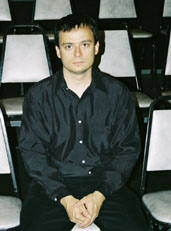
Rusty Banks is a composer/guitarist/teacher originally from Jasper, AL, now living in Pennsylvania.
His compositions benefit from themes relating to regions or environments. For example, his composition commissioned by the Alabama Music Teacher Association's 2004 convention featured audio samples from the Cahaba River, Alabama's last free-flowing river. Another work, "Long Pine Creek: New Year's Day," uses sounds from Long Pine Creek in Nebraska. His compositions range from traditional concert music to sonic installations where boom boxes are scattered throughout a room. His music is described as thoroughly modern, yet accessible, a description he shudders at, but reluctantly accepts. His compositions may be heard on Living Artist Recordings, as well as his web site, rustybanks.org.
|

Sunday, May 27, 2007
Spatial Someone

Kennesaw State students assist with a soundcheck for HYDROLOGY.
_
_
_
_
When I was booked to play an Earth Day concert in Birmingham for the ArtBurst concert series, I wanted to add another stop or two in the Southeast. I found Laurence Sherr on the American Composers Forum website and he sent Blue Ridge Frescos for solo guitar. Perfect. It fit my not-so-heavy-handed, eco-themed show for guitar and/or guitar with electronics. I put together a show I call RUSTY BANKS: SPATIAL SOMEONE. It featured works by composers who have some tie to the South.
Laurence agreed to bring me to Kennesaw State University (a bit north of Hot-lanta) to do some comp lessons, guitar lessons, a lecture, and a concert.
My favorite thing about Kennesaw was the cross-pollination going on between the performance and composition elements on campus. Often, the guitar students would have original pieces to show me. Mary Akerman (Instructor of Guitar) was very supportive of this, and seems to do much to foster students to be creative as well as athletic (her students are as technically sound as they are creative).
There was a time when separating music into composition and performance to the extent we do now could not have been imagined.
posted by Rusty Banks
|
| |



